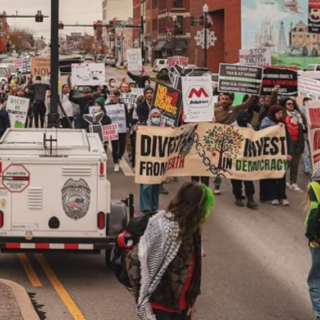Immigrants’ awareness of their civil rights is gaining traction – but if you see ICE, take a picture
Tension is high in Columbus amongst immigrants and activists, yet white America will never know the fear of being an undocumented immigrant of color, especially now.
Making things worse for our local immigrant community was a false Columbus Reddit post of U.S. Immigration and Customs Enforcement (ICE) agents stalking international grocery stores on the North Side back in late January. A post with no photo or video yet read by tens-of-thousand.
Whether it was a white advocate who mistook what they saw, or a miserable neo-Nazi out for more spite, is unknown. The Brooklyn-based The Haitian Times reported how the post led to “rumors” which “quickly gained traction, sparking fear in the city’s immigrant communities.”
“I was here yesterday [the day of the false sighting], the place was peaceful,” Marine Jeudi, a frequent customer at the grocery store, told The Haitian Times. “Pa genyen ICE operation la non, wap fe moun pe,” she added in Creole, as she is Haitian. (“There’s no ICE operation here, you’re scaring people.”)
So far, Central Ohio has not witnessed the ICE workplace raids and sizable arrests made in the Cleveland area. Thank heavens, but the police-state apologists at our local broadcast news stations keep asking, “Where’s ICE?” There is an ICE office in Westerville, but just a handful of local arrests have been made, according to these same stations.
Remarkably good in some ways is how a silver lining is emerging during these dystopian days –an awakening of sorts in our immigrant communities. People are “getting educated,” says one of Ohio’s leading immigrant advocates, Cleveland’s Lynn Tramonte, director of the Ohio Immigrant Alliance.
“People are learning not to open their doors. And businesses are learning they have to ask to see a warrant, and if it’s a judicial warrant, they are learning they don’t have to answer question right away and go call the owner,” Tramonte told the Free Press. “I completely agree that false rumors are needlessly terrifying. Ohio Immigrant Alliance is not spreading anything that we haven’t verified. But the rumors are also compelling organizations and leaders to do more know-your-rights education and that is definitely working.”
Case in point was how MAGA man’s anger, ego mania and stupidity was on full display when “border czar” Tom Homan admitted to CNN that Chicago was making it too damn difficult for ICE.
“Chicago, very well educated,” he said. “They’ve been educated on how to defy ICE, on how to hide from ICE. They call it ‘Know Your Rights.’”
In Ohio, it is easy to think the MAGA cult and law enforcement looks at Latinos, Haitians, people from our Southern Hemisphere, and automatically thinks “illegal.” The worry is that overzealous ICE, the Columbus police, and others become loose with the law, especially if ICE has unrealistic quotas to fill.
Back in late January local immigration attorney Inna Simakovsky told the Dispatch “It was like a SWAT raid” when one of her clients was wrongly detained by ICE and sent to an ICE-contracted county jail two hours north. He returned home after ICE was shown his work permit.
One reason why he was sent so far away was because it was Tramonte and her contingent of advocates whose activism shut down two ICE-contracted county jails in Ohio during the Biden administration. Proof that regular citizens can affect serious change. One of the jails shutdown was in Butler County, near many food processing plants where immigrants work. A hellhole managed by Sherrif Richard Jones, the ultra-conservative anti-immigration blowhard who is a regular guest on right-wing media such as Glenn Beck.
Jones’s ICE jail, where many Columbus African and Muslim men had been sent to, had numerous complaints of violence and racism by correction officers.
“We worked with immigrants on the inside to bring legal and advocacy strategies to bear that forced the closure of two ICE contracts,” said Tramonte.
There are plenty of resources – such as the “Red Card” pictured below – available for immigrants to know their rights. The ACLU also has much to offer and is trying to make this loud and clear: “The ACLU emphasizes that regardless of immigration status, individuals have guaranteed rights under the Constitution.”
How to reduce risk to yourself:
Stay calm. Don’t run, argue, resist, or obstruct the officer, even if you believe your rights are being violated. Keep your hands where police can see them.
Don’t lie about your status or provide false documents.
Your rights:
You have the right to remain silent and do not have to discuss your immigration or citizenship status with police, immigration agents, or other officials. Anything you tell an officer can later be used against you in immigration court.
If you are not a U.S. citizen and an immigration agent requests your immigration papers, you must show them if you have them with you.
If an immigration agent asks if they can search you, you have the right to say no. Agents do not have the right to search you or your belongings without your consent or probable cause.
If you’re over 18, carry your papers with you at all times. If you don’t have them, tell the officer that you want to remain silent, or that you want to consult a lawyer before answering any questions.
What to do in such an encounter:
In some states, you must provide your name to law enforcement if you are stopped and told to identify yourself. But even if you give your name, you don’t have to answer other questions.
If you are driving and are pulled over, the officer can require you to show your license, vehicle registration and proof of insurance, but you don’t have to answer questions about your immigration status.
Customs officers can ask about your immigration status when entering or leaving the country. If you are a lawful permanent resident (LPR) who has maintained your status, you only have to answer questions establishing your identity and permanent residency. Refusal to answer other questions will likely cause delay, but officials may not deny you entry into the United States for failure to answer other questions. If you are a non-citizen visa holder, you may be denied entry into the U.S. if you refuse to answer officers’ questions.
Versión en español
Concientización de sus derechos civiles aumenta entre inmigrantes: si el ICE se asoma a tu puerta, ¡tómale la foto!
por la redacción traducción NS
Entre inmigrantes y los activistas que les apoya la tensión incrementa, pero entre la gente eurodescendiente el miedo a ser indocumentado y de color siempre pasará desapercibido.
Un reporte falso circulado en Reddit sobre elementos del Servicio de Inmigración y Control de Aduanas (ICE) emboscando los supermercados en el lado norte de la ciudad en enero sólo sirvió para empeorarlo. Aunque no tuvo ninguna foto o video, atrajo docenas de miles de lectores.
No se sabe quién lo publicó, si fuera algún activista pro-blanco o un neonazi miserable. La voz se corrió hasta la ciudad de Nueva York, donde el periódico The Haitian Times informó que la publicación condujo a “rumores … que tomaron vuelo vertiginoso, sembrando miedo entre las comunidades de inmigrantes”.
Hasta el momento, la zona central del estado no ha padecido los asaltos de ICE en los lugares de trabajo que aterrorizan a Cleveland. No obstante, los sicarios del estado policiaco en los noticieros locales preguntan una y otra vez: “¿Dónde anda el ICE?” Estas estaciones televisivas indican que ICE tiene un despacho en Westerville, dentro de la zona metropolitana de Columbus, pero sólo ha realizado unos cuantos arrestos.
De alguna manera, desde cierta óptica brotó un haz de esperanza entre los panoramas distópicos: un despertar, por así decirlo, en nuestras comunidades inmigrantes. La gente se está “educando”, comenta una de las principales defensoras de los inmigrantes en Ohio, Lynn Tramonte, directora Alianza Ohioana para Inmigrantes (OIA).
“La gente está aprendiendo a no abrir sus puertas —Tramonte relató al Free Press—. De la misma forma los negocios aprenden que tienen que pedir ver el orden judicial, y es así, están aprendiendo que no tienen que responder preguntas inmediatamente, sino pueden llamar al propietario”. “Estoy cien por ciento de acuerdo con que los rumores falsos siembran terror innecesariamente. La Alianza jamás difunde nada que no hayamos verificado previamente. Pero es innegable que los rumores impulsan a las organizaciones y líderes a educar sobre los derechos, y eso está funcionando de manera contundente.”
Caso concreto fue cuando el trumpista “patrón de la frontera” Tom Homan se reventó en frustración, egotismo y pendejez cuando admitió a CNN que la ciudad de Chicago obstaculiza las labores del ICE: “Los chicaguenses aprendieron bien la lección de cómo parar el ICE, de cómo esconderse del ICE. Le llaman “Conoce tus derechos”.
No cuesta trabajo imaginar como los trumpistas y los elementos policiacos piensan “ilegal” cada vez que vean una cara con color de la tierra. Es preocupante que el ICE fervoroso, igual a la policía metropolitana, “flexibilicen” las leyes, sobre todo cuando se les ponen cuotas de arresto irrealistas.
Fue en enero de este año cuando la abogada de inmigración Inna Simakovsky comentó al diario local The Columbus Dispatch que: “parecía una redada de la policía militarizada (SWAT)” cuando ICE detuvo un cliente suyo sin la debida fundamentación legal. Se le mandaron a una cárcel municipal subcontratado por el ICE a dos horas de Columbus. Le soltaron después de que mostró su permiso de trabajo.
Entre las razones por las que le enviaron tan lejos era que Tramonte de la Alianza y sus colaboradores lograron cerrar dos otras cárceles municipales privadas ohioanas durante el mandato de Biden —lo cual constituye una prueba que los individuos sí pueden impactar a favor de un cambio—. Una de éstas estuvo en el condado de Butler donde inmigrantes laboren en empacadoras. El calabozo es un mero infierno administrado por el aguacil ultraconservador Richard Jones que jacta en medios derechistas como el programa de Glenn Beck. Encarcelados allí son muchos negros y musulmanes que originaron una serie de quejas sobre la violencia y racismo de parte de los guardias.
Tramonte explica con orgullo que: “colaboramos con reos inmigrantes para imponer estrategias legales y de defensoría que condujeron al cierre de dos cárceles subcontratos del ICE”.
Medidas legales que usted puede ejercer para minimizar riesgos
La “Tarjeta Roja” a continuación es uno de muchos recursos disponibles para que los inmigrantes tomen conciencia de sus derechos. La Unión por las Libertades Civiles Americanas (ACLU) es una asociación de abogados progresistas, y declama a los cuatro vientos que: “Recalcamos que los individuos cuentan con derechos constitucionales, independiente de su estado migratorio”.
La página de la ACLU es: https://www.aclu.org/know-your-rights/immigrants-rights
Entre los consejos figuran:
Mantener la calma. No huir. No discutir, resistir u obstruir a un elemento policiaco, aun cuando se cree que violan los derechos. Mantener las manos a la vista del oficial.
No mentir sobre el estado migratorio, ni tampoco proporcionar documentos falsificados.
Conocer los derechos civiles
Usted tiene el derecho de guardar silencio. Nadie puede obligarle a comentar sobre su estado migratorio con un policía, agente migratorio u otro elemento. Acuérdese que todo lo que comente puede ser manejado en su contra en el contexto de un juicio migratorio.
Por otro lado, siempre y cuando se trata de un agente migratorio, si éste le pida revisar sus documentos migratorios, usted tiene la obligación a presentárselos si los tiene a mano.
Aunque puede obligarle a revisar sus documentos, no está facultado para revisar su persona sin su permiso, es decir, usted tiene el derecho de negar que registre su persona y pertenencias, salvo que el agente muestre causa probable.
Si usted es mayor de edad, con 18 años o más, debe cargar sus documentos migratorios originales en todo momento. Si no los tenga en el momento, dile al oficial que desea apegarse a su derecho de quedarse en silencio, o bien consultar un abogado antes de responder a cualquier interrogatorio.
¿Qué hacer en caso de que le detenga un oficial?
En algunos estados de la Unión Americana es mandatorio decir su nombre cuando un oficial policiaco le detenga y ordene a identificarse. Pero no le puede obligar a responder a ninguna pregunta adicional.
En el caso de conducir un vehículo, los oficiales de tránsito están facultados para ordenarle a presentar la licencia para conducir, tarjeta de circulación (registry) y comprobante de seguro automovilístico. Pero no le puede obligar a responder a ninguna pregunta relacionado con su estado migratorio.
Son los agentes aduanales los que son facultados para indagar sobre el estado migratorio en el momento de cruzar la frontera, entrando o saliendo. Residentes permanentes (lawful permanent resident) que mantienen su estado sólo están obligados a responder sobre su identidad y dicha residencia. Rehusar responder a preguntas de esta índole provocará demoras, pero no pueden negarle entrada al país por no responder a las demás preguntas. Por otro lado, se puede negar la entrada a no ciudadanos con visas si no respondan al interrogatorio del oficial.




